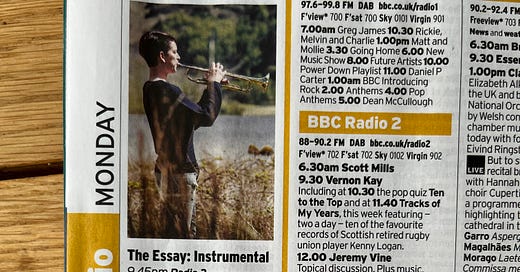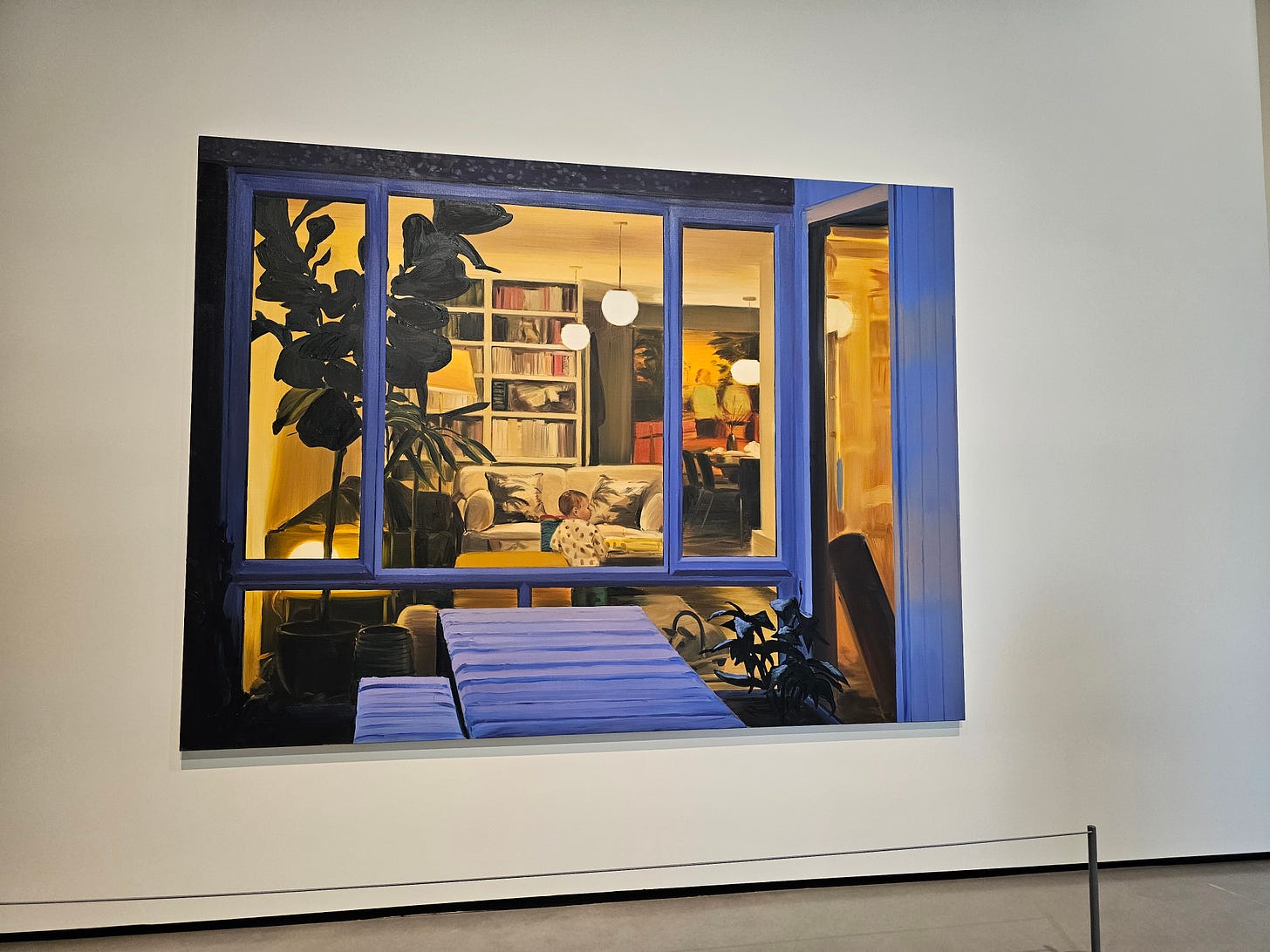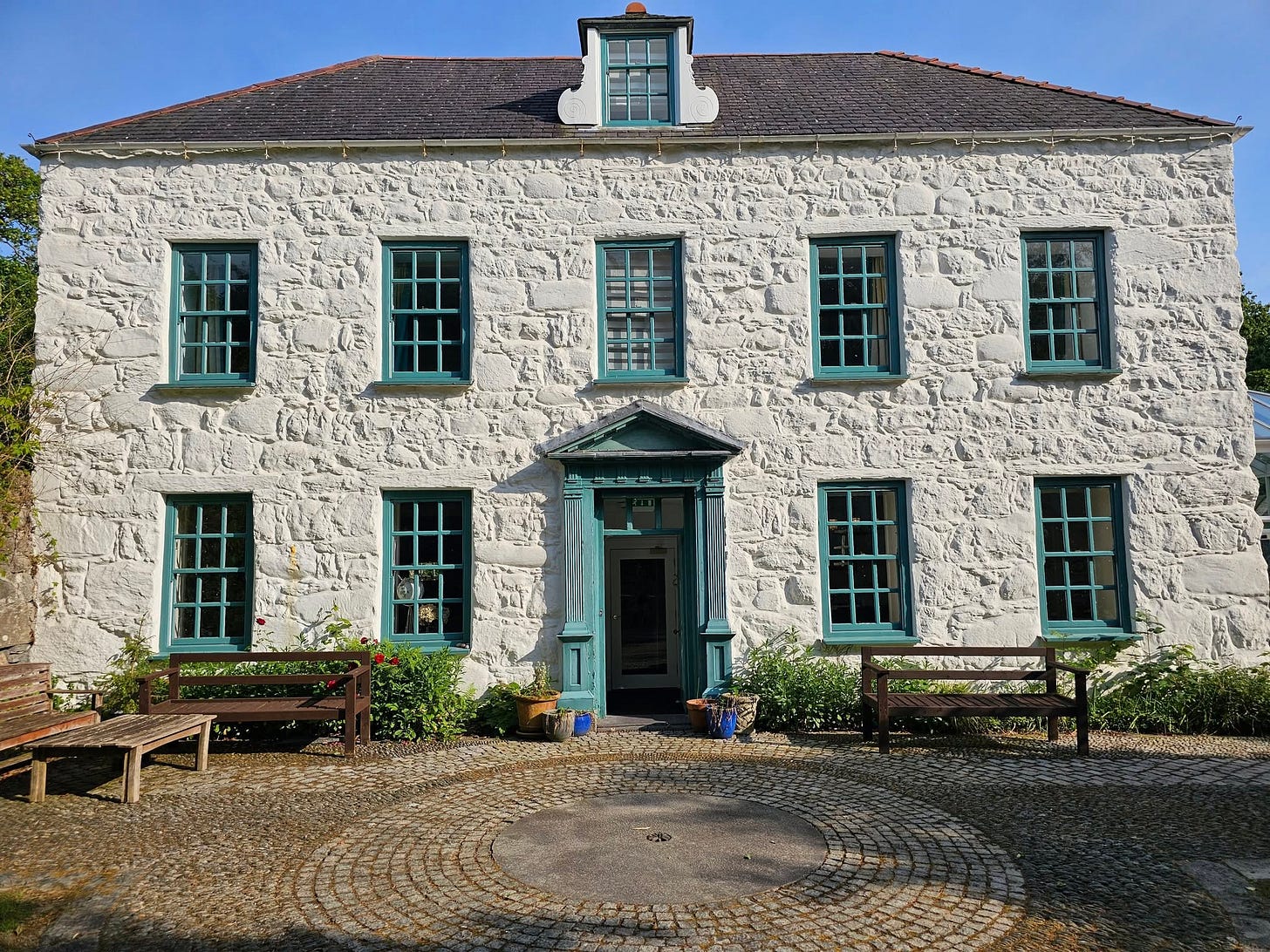One of the things that happen on a writing retreat is that of course you have to come back home! My idyllic week away in Galloway feels like a hundred years ago already, and this post is long overdue, for a whole variety of reasons. I meant to write this the day after I got back, once I’d put my daughter to sleep but all of my best laid plans fell apart when I got home. But before I talk about what happened next, I want to tell you about the last two days of the writing retreat. Part of this is because I want to remind myself after the tough couple of weeks I’ve had that for a whole five days I had time and space to just write, even if it did feel like I had to pay for it afterwards.
On the Wednesday of the writing retreat, the siren call of Wigtown lured me out of the garden. I’d tried to tell myself I didn’t need to go and buy more books - but how often do you get to go to go to Scotland’s national book town? I spent most of the afternoon in Wigtown poking around the bookshops, had some lovely conversations with friendly booksellers, and went back to the Galloway estate having supported the local economy (i.e bought loads of books). That evening, I finished another draft of a short story I’ve been working on and thinking about for a while.
The short story is based on a true story that someone else told me. It is a traumatic story, and I think I’m still trying to work out what I really want the story to say. I know that it has to do something more than just retell this story. In her essay “Kingfishers Catching Fire: Looking with Poetry’s Eyes” (taken from her book Ten Windows: How Great Poems Transform the World” Jane Hirshfield writes that “A work of art is not a piece of fruit lifted from a tree branch: it is a ripening collaboration of artist, receiver and world”.
This book is specifically about poetry, but it’s interesting that she doesn’t use the word ‘poem’ - instead she uses ‘A work of art’ because I think this statement is one that we can transpose onto any art form - something has to be transformed, and this something has to be done in the space between the writer, the reader and the world or context in which they encounter the piece of art.
Perhaps my story is not about the story, extraordinary and terrible though it is, but our relationship with the stories of our lives, the damage caused by violence, not just the direct damage to a victim, but to those caught in the aftershock of violence, the spreading rings of its effects and consequences? But this isn’t quite right either, so I will keep writing and re-writing the story until the river of language washes away a little bit more silt and I can see more clearly.
Thursday, the last day of the residency and I am determined to start writing something new and I’ve had an idea for a short story - or I have a title anyway: “The House of Spiders”
Here is the first paragraph from my notebook:
My mother tells me that in the House of Spiders, there are bodies everywhere. They hang like stars, unmoving, balletic, completely themselves – suspended from the arched ceilings, nestled in the corners of wooden beams. A strange stillness surrounds them, as if everything has paused in their vicinity. Here is one inside a lampshade, a tiny secret of its own. And another next to the light switch, unafraid of unseeing hands and their comings and goings, and all of them waiting for something that goes beyond what you and I can know.
I’m sure the idea for this story owes a debt to the dark, magic realism of much of Carmen Maria Machado’s short stories, which I’ve been reading periodically throughout the week. All day Thursday and all of Thursday night I write and rewrite this story - I can’t make myself do anything else except try to work out what the House of Spiders is.
Perhaps the title has also sprang from the title from my next collection which I’ve also been working on this week - The House of Broken Things. I’m becoming more and more interested in the house as a political, emotional, dangerous space - the stage where so many of the dramas of our lives take place, where if we are lucky, we feel safe, and if we are unlucky, we can be damaged, perhaps beyond straight-forward repair.
I am sad to leave on Friday - it feels as if the week has flown by. It’s the first time I’ve tried to do a retreat without the security of friends around me and I’m surprised by how much I enjoyed it. I’ve learnt, at the grand age of 43 that being on my own is valuable and that I can do it, and that I enjoy it.
When I arrive back in Hebden, I find my daughter and husband happy to see me, but my daughter has a few suspicious spots behind her ears - the dreaded chicken pox, which has been going around her school for a few months now. My heart sank at this - my life is so finely balanced between what I can manage and what I can’t that I knew the whole pack of cards was about to come tumbling down.
We had an awful weekend - she woke up at 10pm and stayed awake till 4am for three nights on the run - crying with a high temperature and itching. She was covered in spots - even inside her mouth and on her throat which made eating and drinking difficult. My husband went off on Monday for his own walking holiday so I was solo parenting that week, as well as trying to keep up with my university marking. It would have been difficult if she’d been at school, but with chicken pox, it felt impossible.
Looking back now, I think I was a little bit mad during that week - from lack of sleep, and worry. I think it brought back all the memories of early motherhood, when I also had no sleep and was permanently worried and anxious - these two times started to bleed together in my head and I experienced that same sense of claustrophobia as I was waiting for her to fall asleep, this kind of desperation to get out, get anywhere - except I couldn’t, except I can’t.
But it was also a week where I got to know my daughter even more, to spend endless hours making a rocket out of empty cardboard boxes, the rocket getting larger and more complicated and elaborate. Drawing with her from online tutorials, making our own ‘art gallery’ of paintings, pouring porridge oats into socks and putting her in the milky eye of a bath, and yes, even marking sometimes next to her as she watched TV.
It wasn’t until my husband came back the following Friday that I realised I hadn’t had a bath or a shower for 8 days - the week was so intense, and the instinct to efface myself, to make any needs I had not exist so that I could look after her was all-consuming. Writing this now sounds ridiculous, but this was what early motherhood was like as well in those days of breastfeeding and bedsharing. It was dislocating to feel myself travelling back in time, whilst something of my self remained in the present, a tiny voice of reason that I certainly didn’t listen to. I was ill after the chickenpox week - who knew that effacement and wiping the self out of existence was bad for you!
My mum and dad came to visit that weekend and we all went to the Hepworth Gallery in Wakefield which was exactly what I needed to reset my brain again, or to clear out my mind. They have a brilliant exhibition of work by Helen Chadwick, which I would like to write more about later, and the gallery is set up wonderfully for children - with small art stations in a lot of the rooms so my daughter sat and coloured whilst I got a chance to look around.
The other artist on exhibition at the moment is Caroline Walker, who I knew nothing about. I didn’t expect to be so moved by her paintings about the work of motherhood, but I sat in front of this one and cried. I’m not quite sure yet why I found it so moving - it’s something about the way the artist is standing outside this intimate domestic space looking in. It feels an incredibly lonely place to stand as a mother - but as an artist, absolutely necessary - to come outside from the inside, to be separated by a pane of glass, by the decision to stop the work of mothering and begin the work of art-making. I’m planning to go back again to the exhibition and hope to write something a little more sensible!
I am now away in Ty Newydd, one of my favourite places in the world, running a course with Roger Robinson. Yesterday I went for a glorious run along the coast before the course started - today we’ve just finished our first workshop, full of prose poems and Ars Poetica.
Other news - on Monday June 9th at 9.45pm I’ll be on Radio 3 as episode 1 of five episode “The Essay: Instrumental”. Below is a photo the presenter Alan Hall sent me - the episode has been chosen as a choice in the Radio Times! There are a few clips of me playing Concerto D’Aranjuez with Askam Band on flugelhorn and playing the same piece solo on my trumpet, and a recording of me playing the Last Post - all done when I was in practice a few years ago!
Thank you for reading and I will be posting a paid subscriber post very soon as well as my reading recommendations for May…







Kim thank you so much for your gloriously Kim-mish account of those overwhelming days of your Kimming your indefatigable way through your life - something about the engagement with everything - the good, the too much, the stuff which shouldn't have been, or.......your words sustain me, despite my inertia...Best and remembering what Clare reminded us about loving.....LoveTom
Wow, what an amazing, exhausting, stimulating and productive time Kim.